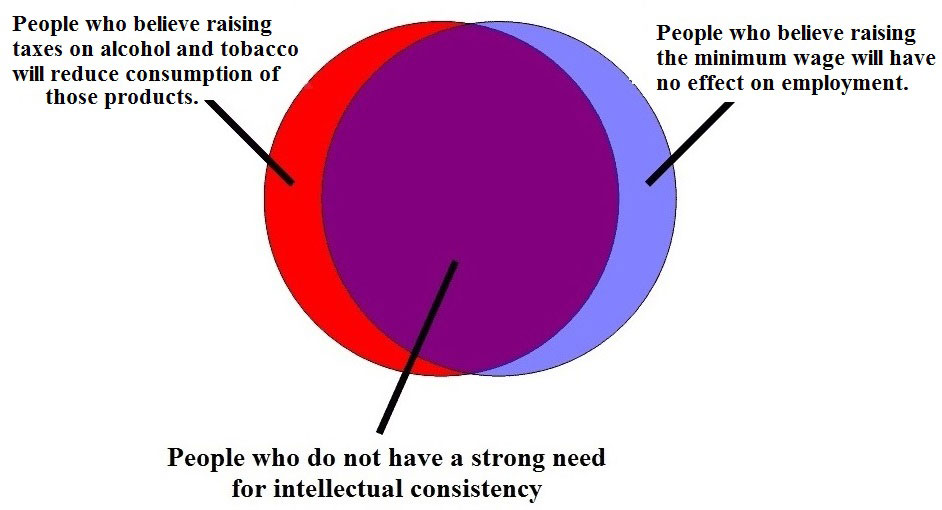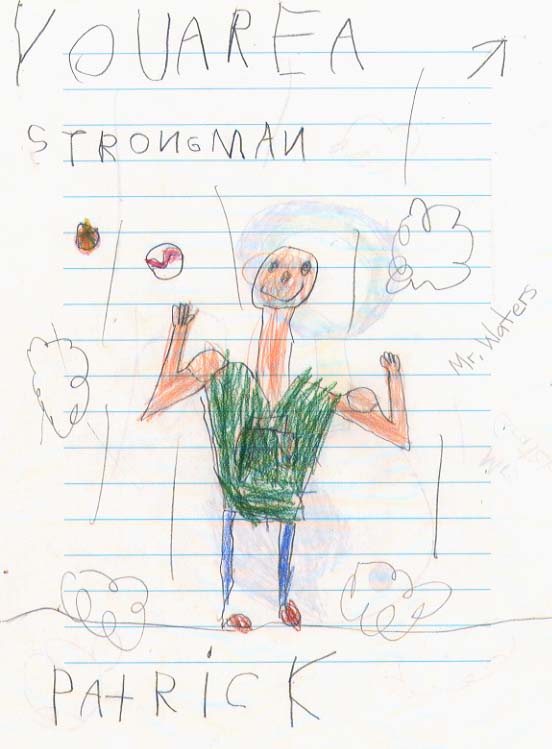
Educating Stability Table of Contents
Previous chapter: Educating Stability: Individuals and Society
Those who created the Common Core frameworks lessons endeavored to block out competing alternatives. Complex implementations serve as barriers to entry. They endeavored to turn a competition of ideas into a competition of graphic organizers and pre-approved lesson plans.
Along the way, a small set of vendors have been building barriers of approved textbooks. Whatever other better approaches may exist, they are at a disadvantage without textbooks and graphic organizers.
More important, it is not Common Core that will make the difference in student success. It is the ability of individual teachers to positively engage individual students. That’s what good teachers do, because each student’s needs are different. This magnifies the need for effective principals who are obliged to spend time in each classroom in a process of continuous evaluation. Just as an economy is so complex that over-centralization is a hindrance to the unseen hand, control of education from the center is disruptive.
Most important, writing is what engages the youngest minds most effectively. The methods encouraged by Lucy Calkins’ Reading & Writing Project provide traction to students that encourages self-regulated learning without overbearing accreditor approved testing.
New York State has set grade level focus that repeats the hazards of the C3 Framework themes insofar as the topics are arbitrary and disconnected. While traditional, the approach misses:
The New York grade level focus is different from the sample lessons on the EngageNY.com website, which follows more closely the C3 Framework. Nevertheless, here is a sampling of the kinds of things that can be easily integrated into current classes, using the time currently tied to student assessments ostensibly used to measure teacher performance. Teachers and principals should use student assessments evaluate the progress of individual students.
Kindergarten Self and Others

Grade 1 My Family and Other Families, Now and Long Ago
Grade 2 My Community and Other United States Communities, and Grade 3 Communities around the World
Grade 4 Local History and Local Government
Grade 5 The Western Hemisphere and Grade 6 The Eastern Hemisphere
Grade 7 History of the United States and New York – I and Grade 8 History of the United States and New York – II
Grade 9 Global History and Geography – I and Grade 10 Global History and Geography – II
Grade 11 United States History and Government
Grade 12 Participation in Government; Economics, the Enterprise System, and Finance
Classroom manner: What a teacher does in the classroom matters, not foremost in teaching subjects, but as a role model. When a mistake is made drawing, say, simple addition on the board in front of a class, some teachers would gloss over an error pointed out by a student. Good teachers make the mistake a teachable moment. “Thank you. I’m grateful that you pointed out my mistake. I am not perfect and depend on others to help me.” To be seen as not perfect and in need of the assistance of others models for children they need to be humble and open about their own mistakes. It reinforces that people make decisions based on a mental map of reality, not reality itself. Similarly, the incentive to associate with others springs from individual humility about how exposed we will be if we don’t cooperate.
Subjects are the perfect vehicles to encourage a sound understanding of simple wisdoms. Every subject is an opportunity for joy. Release the hounds!
Writing, phonics, cursive, grammar, logic, rhetoric, logical fallacies, literature, etc. are woven into courses at every level. This is just a sampling of teachable moments woven into an everyday classroom experience:
Kindergarten:
Art: is a pleasure, a tool, and a metaphor.
In the table below, questions on the left come from the August 2010 NYS Global Studies Regents Exam. Questions on the right test life lessons accessible to students, essential to master, and substantially missed by the official exam. None of the 50 official multiple-choice questions seemed to test a core concept of society, the civilization we trust to maintain it, or the citizenship we want to carry on. None challenge students to read their texts to work out how they fit with what each student currently understands. Useful life lessons could be made accessible to students willing and able to learn them, with little effort and no extra time in the classroom.
| August 2010 NYS Global History Exam | Proposed more functional exam |
|---|
1 Which document is considered a primary source? (1) encyclopedia article(2) modern textbook (3) biography (4) personal correspondence |
1 Which document is trustworthy? (1) encyclopedia article (2) modern textbook (3) personal correspondence (4) none of the above can be guaranteed trustworthy Correct answer: 4. Each individual has to be the final arbiter of what to believe. One has to become the expert at weighing and sifting for inconsistencies in books, newspapers, encyclopedias, and even in primary sources. |
2 Which title best completes the partial outline below? I. ______________________________A. Located in a region of volcanoes and earthquakes B. Has limited mineral resources C. Concentration of population in coastal plains (1) Geographic Features of Japan (2) Environmental Challenges in Mongolia (3) Economic Issues Facing Saudi Arabia (4) Factors Affecting British Industrialization |
2 Which events indicate the need to take an active role in checking the quality and content of your own education? (1) substitution of whole language at the expense of phonics and decoding in teaching reading(2) introduction of new math that removed learning basic multiplication (3) During the space shuttle Challenger hearings, Richard Feynman showed with a glass of ice water the proximate cause of O-ring failure that other scientists glossed over (4) all of the above To ignite the spark of learning, students need to be nudged toward taking responsibility for their own future. They need to learn why it is in their own best interest to become self-regulated learners. |
|
3 Which Neolithic Revolution development led to the other three? (1) complex civilizations(2) surplus of food (3) division of labor (4) domestication of plants and animal |
3 When one invents something, who benefits from the wealth created? (1) the inventor of the invention(2) workers of the company the inventor works for (3) customers who buy the invention from the company (4) all of the above Correct answer: 4. The domestication of plants and animals that made incrementally more time available for people to spend doing other things created wealth. Wealth can lead to improvement in the quality of life. Whenever one creates a more efficient way of doing the same amount of work, the time saved becomes wealth that can be used to do other things. Wealth, when created, belongs to everyone—employees, customers, and shareholders. Increased wealth improves the quality to life of everyone. When an inventor, an entrepreneur, an artist creates something others value, he can become wealthy, but that wealth immediately is distributed to others through services rendered, products bought, or savings invested. |
|
4 •The Ganges River is sacred to people practicing Hinduism. • Shinto shrines are usually located near mountains or lakes. • The Jordan River is a site of many Christian baptisms. Which conclusion is most valid based on these statements related to belief systems? (1) The Middle East was the birthplace of these belief systems.(2) Water plays an important role in these belief systems. (3) Pilgrimages to mountainous regions are encouraged by these belief systems. (4) Understanding nature is a requirement of these belief systems. |
4 From personal experience, which statement can one justify? (1) since a culture is something its members believe, no one outside that culture can judge it(2) cultures take precedence over society (3) cultures matter more than the individuals who created them (4) individuals manufacture society Correct answer: 4. A simple fabric underlies diverse cultural beliefs to form the minimum requirements of all civil society. One thread, humility, comes from understanding you are not always correct, and another thread, reciprocity, comes from appreciation that others, like you, are as acutely interested in understanding the world more accurately, the better to plan their own future. Culture is like the pile of a carpet, varying in many different ways, held together by humility and reciprocity as the underlying warp and weft. |
|
Base your answer to question 5 on the illustration below and on your knowledge of social studies. 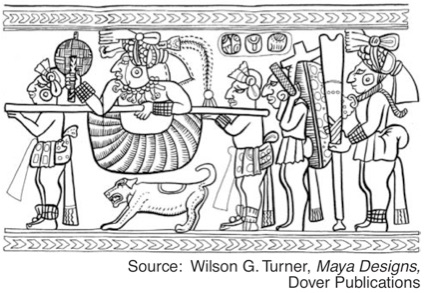
5 Which element of civilization is most clearly shown in this Maya artwork? (1) urbanization(2) a system of education (3) a code of laws (4) social classes |
5 Which statement is true about arbitrary distinctions? (1) racism is ignorant overgeneralization(2) people interact with each other one on one (3) hamburger can be divided many different ways, all valid, and it’s still hamburger (4) all of the above Correct answer: 4. Class is an arbitrary abstraction often used to obfuscate that people deal with each other individually, one-on-one, and behavior that matters individually becomes behavior that matters collectively. |
6 Which achievements are most closely associated with the Tang and Song dynasties of China? (1) wheel and stirrup(2) chinampas and calendar (3) gunpowder and movable wooden type (4) mosaics and domes |
6 Copyrights are designed to? (1) benefit the creator(2) benefit the creator’s descendents (3) benefit the company the creator works for (4) benefit the creator and society Correct answer: 4. Inventions benefit all society, creating new wealth by improving providing goods and services to people. In our time, governments make bargains called patents and copyrights with inventors and artists that work to the benefit of each. Creators receive the profits of their work for a time and then those creations are made available to the rest of society to be further refined and developed. In recent time changes have been made to copyright law to favor descendents instead of creators, jeopardizing the mutually beneficial relationship with society. |
7 Korea has frequently served as a cultural bridge between (1) Cambodia and Vietnam(2) Russia and India (3) Thailand and Indonesia (4) China and Japan |
7 Where do cultural traditions fit in governance? (1) cultural traditions are not compelling to those of different cultural traditions(2) cultural traditions are more important than religious traditions (3) religious traditions take precedence over cultural traditions (4) our traditions are more important than the traditions of others Correct answer: 1. A culture can govern based on shared traditions, whether they are religious or social, but when a culture tries to impose that tradition on others who do not follow those traditions or beliefs, the only options are to convince them to adopt those beliefs or to rule by force. A society of diverse cultures is likely to be mores stable if it is based on conclusions developed from individual experience that leads to a common result. What conclusions can be developed from your personal experience that others from different cultures are also likely to conclude? |
|
8 Which institution served as the primary unifying force in medieval western Europe? (1) legislature(2) church (3) monarchy (4) military |
8 Which institution served better organizing society to solve its problems? (1) religion(2) absolutism (3) militarism (4) none of the above Correct answer: 4. Government is a creation of individuals designed to work on their behalf, but what powers should a government have, and what checks and balances are effective. Each century since the middle ages has emphasized one type of organizing system to address social concerns, and each has left problems for the next century to clean up:
The problem is not the unifying force, but creating a self-correcting process that is unlikely to be hijacked or sent permanently down a self-defeating path. |
Base your answer to question 9 on the map below and on your knowledge of social studies. Newcomers in the Roman World, c. AD 526 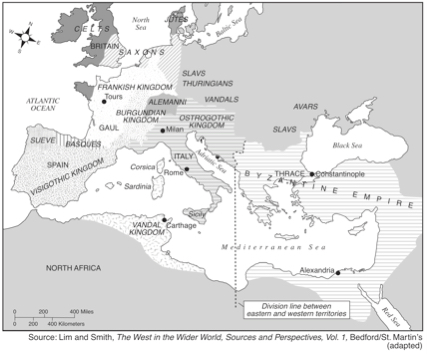 9 Which conclusion about the Roman world around AD 526 can be drawn from the information on this map? (1) The Gauls dominated trade on the Mediterranean Sea.(2) Rome was the capital of the entire western region. (3) The eastern region was unified under the Byzantine Empire. (4) The division between eastern and western Rome followed natural boundaries. |
9 As cultures have organized into ever increasing size across history, which size works best? (1) no particular size works best(2) city-states (3) nations (4) feudal kingdoms Correct answer: 1. Across history cultures have organized into entities ever increasing in size—towns, provinces, states, and nations, facilitated by better communications and support structures. But nations are a new phenomenon, not necessarily well suited to advance their citizens or society. |
10 Which change to Christian church practice was suggested by Martin Luther? (1) increasing the sale of indulgences(2) installing statues of saints in churches (3) saying the mass in Latin so the faithful would learn it (4) printing the Bible in the vernacular so all could read it |
10 For political decisions, who is most trustworthy? (1) scientists and academics(2) religious leaders (3) political leaders (4) none of the above Correct answer: 4. Experts of any flavor, whether religious, political, scientific, or other, are obliged to express what they know so that other ordinary individuals can understand and validate it for themselves. There is no special knowledge. There is no hiding behind degrees, white coats, or clerical collars. |
11 The trans-Saharan trade carried out by West African civilizations was primarily based on an exchange of (1) gold and salt(2) ivory and silk (3) silver and tea (4) hardwoods and animal skins |
11 What is the goal of money? (1) to get rich(2) to hoard (3) to do whatever you wish to accomplish (4) all of the above Correct answer: 3. Economics is often misunderstood—reduced to examination of money as the medium of exchange, but money goals are not usually the goals of individual transactions; goals should be understood according to what each individual wishes to accomplish. Understanding that helps one understand that self-interest is different than selfishness. |
Base your answer to question 12 on the map below and on your knowledge of social studies. 
12 Based on the information provided by this map, which statement about urban areas between 650 and 1500 is accurate? (1) Most urbanization occurred in the Southern Hemisphere.(2) Most urbanization is associated with a tropical climate. (3) Most urban areas were located in Europe. (4) Most urban areas developed near waterways. |
12 What would rival the unsettling changes of rural workers moving to factories in urban areas between 1875 and 1925? (1) the current information revolution between 1975 and 2025(2) the first industrial or steam revolution (3) the agrarian revolution (4) all of the above Correct answer: 4. The agrarian revolution, the steam revolution, the scientific revolution, and the computer revolution have had profound but temporary effects on cultures. Between 1875 and 1925 was a mass migration from farms to urban areas, where manufacturing and retail brought income to families. A hundred years later a new transition brought a new wave of uncertainty as computer automation and easy transport began to change manufacturing retail base to service and knowledge as the means to bring income into families. How did politicians try to use the changes to gain political power? |
13 China’s image of itself as the Middle Kingdom is associated with (1) welcoming foreign ideas and influences(2) mixing Western religions with traditional Chinese philosophies (3) controlling how contact occurs with other cultures (4) building the Grand Canal to expand trade within China |
13 Who validates governments? (1) religious and hereditary political leaders who have been in charge throughout history(2) individuals who are governed (3) a culture’s governing bodies (4) judicial courts Correct answer: 2. Individuals create their governments and recreate them in every generation. Individuals of any culture depend on an accurate understanding of the world about them to be able to make decisions all citizens of that culture are required to make. When rulers over any culture abuse their authority over individuals of that culture, mechanisms are needed to peacefully correct that abuse or citizens may try other means to recover. |
14 Which factor most influenced the development of diverse cultures in pre-Columbian South America? (1) trade agreements(2) geographic features (3) imported religious ideas (4) peasant revolts |
14 What is society? (1) culture and society are the same(2) society is the better class of people (3) society occurs at the edge where any two individuals or cultures meet (4) none of the above Correct answer: 3. Society is the minimal behavior at the edge where two or more individuals or cultures meet. To avoid moral relativism which can occur whenever cultures meet, and which can lead to Machiavellian “might makes right,” how can those cultures establish a mutually beneficial process of peaceful problem resolution? |
Base your answer to question 15 on the map below and on your knowledge of social studies. 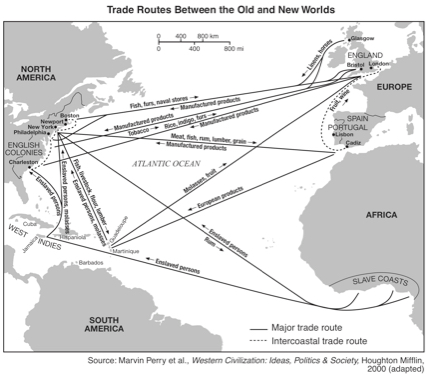
15 Based on the information shown on this map, most manufactured goods were produced in (1) the West Indies(2) Europe (3) English colonies (4) Africa |
15 The commercial marketplace has helped improve the quality of life of more people than any other economic system because: (1) competition encourages efficiency(2) profits are held in check by increased competition (3) market signals help allocate resources (4) all of the above Correct answer: 4. Development of commercial marketplace occurs in several stages. Its growth is facilitated by liberty that encourages division of labor, resources that include capital, and a ready market. Protectionist policies at the outset, can favor start up of industry that otherwise would be inefficient, however, in mature markets, protectionism negatively affect individuals, forcing them to pay higher prices for goods and services than they normally would. |
16 What was a key characteristic of an absolute monarchy in the 16th and 17th centuries? (1) centralized governmental authority(2) increased political rights for peasants and serfs (3) freedom of religion (4) a system of checks and balances |
16 Can individuals safely leave their governance up to others to solve society’s problems? (1) no, centuries of experience have shown delegated power needs supervision(2) yes, because the two party system assures good governance (3) yes, because we’ve done alright so far (4) yes, because of the United Nations Correct answer: 1. Each century since the middle ages has attempted to organize to address social issues. First religion-based, then autocratic, then science-based, then technology-based, and, in the last century, centralized communications based, all with limited success. |
17 The signing of the Magna Carta in 1215 and the Glorious Revolution in 1688 were key events in English history because they resulted in (1) creating alliances with France(2) defeating Protestant nobles (3) limiting the power of the monarchy (4) annexing territory |
17 The primary purpose of teaching citizenship should be to: (1) create docile compliant citizens(2) bring citizens together (3) help people understand their responsibilities to themselves and others (4) help the least among us Correct answer: 3. What is the purpose of citizenship? For classical Greeks citizenship required drill to function as a team in the chorus or on the battlefield. For the classical Romans it required the study of Rhetoric to put thoughts in order and present them compellingly to others in political debate. Should citizenship try to create competent individuals, docile compliant citizens, or something else? |
Base your answer to question 18 on the passage below and on your knowledge of social studies. . . . The Mongols made no technological breakthroughs, founded no new religions, wrote few books or dramas, and gave the world no new crops or methods of agriculture. Their own craftsmen could not weave cloth, cast metal, make pottery, or even bake bread. They manufactured neither porcelain nor pottery, painted no pictures, and built no buildings. Yet, as their army conquered culture after culture, they collected and passed all of these skills from one civilization to the next. . . . 18 This passage leads to the conclusion that the Mongols (1) rejected technology(2) were a peaceful people (3) were urbanized (4) contributed to cultural diffusion |
18 One can justify society with others from personal experience because it reveals the need for:
(1) humility (2) reciprocity (3) humility and reciprocity (4) sound government Correct answer: 3. One can learn from others, but one has to be open to learn from them. We call it humility when one understands that one can be wrong, that at any time there one may discover a better way to do things, and that the process of self-correction must always be preserved. We call it reciprocity when one recognizes that others live their lives as acutely as we live our own, and that they too may seek better understanding of the world around them. All successful cultures in one way or another believe that one does not do to others what one does not want done to oneself. |
19 Many Enlightenment philosophers used reason to (1) reinforce traditional beliefs(2) strengthen religious authority (3) reveal natural laws (4) encourage censorship |
19 Reason is best used to (1) reinforce traditional beliefs(2) strengthen religious authority (3) reveal natural laws (4) check our work Correct answer: 4. Reason has been misused to persecute witches and commit genocide against millions. Reason is not how we think; it is one tool we use, in concert with others, to check our work. |
20 The unification of Germany under Otto von Bismarck demonstrates the (1) influence of Marxist ideology(2) impact of nationalism (3) force of civil disobedience (4) power of democratic ideals |
20 The nation state is: (1) the culmination of centuries of progress(2) a creation of individuals that can be abused by individuals (3) valuable because majority rules (4) none of the above The nation state is a recent form of government that is owed no special allegiance. It is a creation of individuals to be used to help individuals, but one that equally easily can be abused by individuals. |
|
21 What was a result of the Industrial Revolution in Europe? (1) the growth of the middle class(2) an increase in nomadic herding (3) a decline in urban population (4) a decrease in international trade |
21 Commercial marketplace progressed because of: (1) division of labor(2) development of corporations to spread and limit risk (3) development of rational accounting (4) all of the above Correct answer: 4. The commercial marketplace blossomed in several stages:
|
22 One reason the Suez Canal has been of strategic importance to countries other than Egypt was that the canal (1) allowed for faster movement between the North Atlantic Ocean and the Indian Ocean(2) enabled Europeans to explore the Western Hemisphere (3) made it easier for Russia to gain control of Afghanistan (4) provided the Austro-Hungarian Empire with access to its colonies in South Asia |
22 Adam Smith opposed mercantilism because: (1) wealth is not a zero-sum game(2) wider trade can benefit more individuals and encourages peaceful relations (3) wider trade fosters a healthy middle class (4) all of the above Correct answer: 4. Mercantilists believed that wealth was a zero-sum game where one country’s wealth necessarily came at the expense of another. Show how trade can be an instrument to benefit individuals or benefit the state and that trade that fosters a healthy middle class improves the quality of life for all and helps maintain the mutual peace. |
23 Much of which area of the world came under European colonial control in the 19th century? (1) Japan(2) Southwest Asia (3) Africa (4) Latin America |
23 Colonialism: (1) could only happen in capitalist countries(2) required protectionism and tacit complicity of segments of the colonized country (3) imposed culture on the colony without getting cultural cross-pollination in return (4) was always government run Correct answer: 2. Colonialism was a temporary perturbation of commercial marketplaces made possible by a monopoly assignment by a government to a private company, like the Dutch East India Company. Colonialism is necessarily a two-way street. Colonialism would not have been possible without protectionism or without the tacit complicity of segments of the colonized country, and cultural exchange necessarily travels in both directions. |
24 A similarity between the Sepoy Rebellion in India and the Boxer Rebellion in China is that both were (1) attempts to remove foreign influence(2) movements to establish communist governments (3) efforts to restore trade monopolies (4) struggles to westernize cultures |
24 Monopoly rights granted by governments (1) warped free competition in early international trade leading to colonial abuse(2) efficiently allowed foreign trade to develop (3) worked to benefit both sides of foreign trade (4) all of the above Correct answer: 1. In early attempts at international trade, governments colluded with business to create monopoly companies that overstepped the commercial into the military. How would open commercial competition have helped avoid colonial revolutions? |
Base your answer to question 25 on the passage below and on your knowledge of social studies.
25 Which hypothesis can best be supported by this passage? (1) Allied forces were on the verge of winning the war.(2) Technology had created a military stalemate. (3) Revolution in Russia hastened the end of the war. (4) Conditions contributed to low troop morale. |
25 Peace: (1) is the absence of war(2) sometimes legitimizes oppression (3) is the absence of the need for war (4) both (2) and (3) Correct answer: 4. Both pacifists and generals agree that war is a nasty place to be. But peace isn’t simply the absence of war; it is the absence of the need for war. Sometimes simply enforcing peace legitimizes oppression. What is worth fighting for? A nation? A principle? A process? A tradition? A religion? The courage to stand up for such things comes from mastering when and why such things are worthwhile. |
26 One reason the League of Nations failed as a world organization was that it (1) supported the rise of fascist states(2) lacked a military force to settle conflicts (3) dealt with conflict by establishing naval blockades (4) encouraged the annexation of territory by force |
26 Peace: (1) requires a process that allows for problem resolution short of fighting(2) happens when people unilaterally disarm (3) is what everyone wants (4) all of the above Correct answer: 1. Peace is not the absence of war; it is the absence of the need for war. It is a process that allows for problem resolution short of fighting. People who favor enforced peace absent a mechanism for problem resolution satisfactory to both sides stand for oppression. |
27 Japan’s invasion of China in 1937 and Germany’s attack on Poland in 1939 led directly to (1) the beginning of World War II in Asia and Europe(2) a meeting at Yalta between the United States and the Soviet Union (3) a conference at Munich for European leaders (4) the withdrawal of Britain and France from European affairs |
27 National misbehavior: (1) is not the job of the United Nations to address(2) can’t be judged across cultures (3) is every nation’s responsibility because individuals can’t always defend themselves (4) should be ignored Correct answer: 3. Appeasement of Hitler by British Prime Minister Neville Chamberlain was supposed to lead to “peace in our time” but it led, instead, to war. Addressing misbehavior requires understanding what misbehavior is, even across cultures. In the last century, millions died in war, and because other nations sat by the sidelines when facing down oppression would have saved innocent lives. Even today United Nations rules make it difficult to oppose state-sponsored abuse of citizens. |
28 The Nuremberg Trials are considered an important event in the 20th century because they (1) brought an end to genocide(2) condemned the use of nuclear weapons (3) ruled on provisions for the postwar occupation of Germany (4) established principles of responsibility for human rights violations |
28 Human rights: (1) are created by law(2) are up to nations to negotiate (3) can be deduced by any individual from personal experience (4) all of the above Correct answer: 3. Human rights are not created by law, but may be recognized and set into law. Rights come not from natural law, or from cultural tradition, but are deduced from patterns of experience commonly accessible to all and able to be justified by individuals to apply equally to themselves and to all other individuals. |
29 The North Atlantic Treaty Organization (NATO) was initially formed to (1) promote religious freedom(2) defend Western Europe from Soviet aggression (3) isolate member nations from the rest of the world (4) stop the flow of immigration between member nations |
29 When governments collapse a political vacuum can be created that: (1) may not be able to be remedied without outside intervention(2) allows all kinds of thugs to take advantage of people unable to defend themselves (3) often has not been addressed by the United Nations (4) all of the above The North Atlantic Treaty Organization was created for defensive purposes but has acted in areas outside its physical boundaries in the interests of world stability. |
30 What was one social change Mao Zedong instituted in China after 1949? (1) granting legal equality for men and women(2) requiring arranged marriages (3) adopting the practice of foot binding (4) mandating Confucianism as the state philosophy |
30 Which meaning of equality works most reliably? (1) enforced equality of outcome, as in a Marxian economy(2) equality of opportunity, as in a commercial marketplace (3) equality under the law, that de Tocqueville admired in America (4) both (2) and (3) Correct answer: 4. Equality of opportunity does not guarantee success, but it gives each generation the opportunity to climb out of poverty. Enforced quality of result rewards those who do not try and penalizes those who add to the quality of life for all. |
Base your answers to questions 31 and 32 on the cartoon below and on your knowledge of social studies. 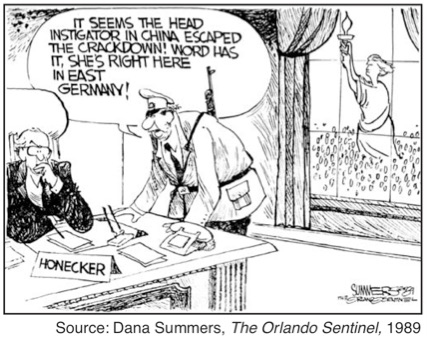
31 This 1989 cartoon suggests that the governments of both China and East Germany (1) removed the military from power(2) allowed a shift in rule from autocracy to fascism (3) gave people the right to decide how they would be ruled (4) faced challenges in their ability to maintain communist governments |
31 The freedom to offend others: (1) has no place in civil society (2) is necessary in any society that wishes to build in a process of continuous improvement (3) has never been justified (4) hurts the least among usCorrect answer: 2. The freedom to express an opinion—to tell someone something they may not wish to hear—is the most fundamental principle in society because people—and governments—can think they are correct when they are mistaken and to be continuously successful society requires the constant opportunity for the smallest voice to try to convince others of a better way to do things. As a corollary, the right to speak one’s mind does not imply the necessity to do so. No one deserves to be harangued during occasions of peaceful reflection. |
32 Which event in China is symbolized by the “Lady with the Light” in this 1989 cartoon? (1) Long March(2) Great Leap Forward (3) Cultural Revolution (4) Tiananmen Square protests |
32 Which of the following is true about the Declaration of Human Rights: (1) International agreement can declare human rights, but that does not necessarily make them so.(2) Overwhelmingly popular ideas become rights. (3) The Declaration said where rights come from. (4) Rights and freedom are the same thing. Correct answer: 1. People often claim “rights” but seldom justify them. Likewise, people seldom claim “responsibilities.” Where do rights come from? Does claiming something to be a right make it one? Does popularity make something a right? Is there a difference between a right and a sensible practice? Is liberty a right? Freedom? Freedom of speech? The freedom to offend? |
33 Which statement about the United Nations is a fact rather than an opinion? (1) The United Nations has too many committees to be effective.(2) The United Nations would be more efficient if its headquarters moved to Europe. (3) The membership of the United Nations has increased since its formation. (4) The United Nations has successfully met most of its goals. |
33 The United Nations: (1) is a tribute to democracy.(2) has a charter clause that shields countries from most internal misbehavior. (3) effectively polices nations around the world. (4) has successfully met most of its goals. Correct answer: 2. A critical flaw in the United Nations shields the internal affairs of members from most scrutiny such that its charter behaves as the national leader full employment act. No matter how a leader assumes power, or stays in power, legitimacy is almost automatically assumed in the United Nations. This borders on the absurd when autocratic rulers who violate the United Nations own Declaration of Human Rights are put on the Human Rights Commission. |
Base your answer to question 34 on the chart below and on your knowledge of social studies. 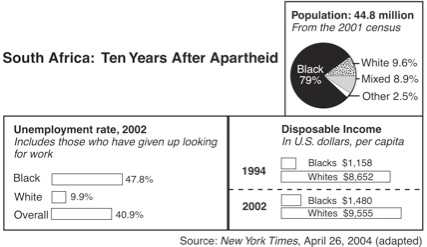
34 Which conclusion about South Africa’s economy can be drawn from this chart? (1) Since the end of apartheid, most blacks have gained economic equality.(2) In some sectors of the economy, blacks earn more than whites. (3) Despite the end of apartheid, many blacks continue to struggle economically. (4) Economic opportunity for blacks is directly related to education reform. |
34 South Africa’s economy: (1) has been hampered mostly by greedy and unethical corporations.(2) has been hampered by an excess of unreasonable laws and restrictions. (3) is booming since apartheid. (4) has fostered many new businesses. Correct answer: 2. Economic equality in South Africa has not been achieved not because businesses are residually unethical, but because there are so few businesses altogether. Political leaders heap social mandates and environmental restrictions on businesses and on individuals who would buy things. Restrictions make it hard to build power plants. Labor laws make it hard to fire people. |
35 Which document is most closely associated with the Arab-Israeli conflict? (1) Balfour Declaration(2) Kyoto Protocol (3) Communist Manifesto (4) Treaty of Nanjing |
35 A nation’s process of peaceful problem resolution: (1) requires separation of powers(2) needs to be set up by constitutional convention (3) may not be able to be set up without external intervention (4) is not important Correct answer: 3. If no political group within a territory can be trusted to govern with impartiality in the interest of those who live there, should a nation be created at all, or, instead, should the territory be governed by outside administrators until the current generation will no longer poison support for peaceful problem resolution. |
36 “Reliance on Imported Oil Raises Concerns in China, Europe, and the United States” “Coca-Cola Accused of Wasting Precious Water in India” “Competition for Control of Cobalt Mines Causes Violence in Congo” These headlines best illustrate the economic concept of (1) inflation(2) embargo (3) boycott of goods (4) scarcity of resources |
36 If sometimes we think we are correct when we are mistaken, a useful check on one’s thinking might be: (1) sighting from the past, through the present, to the future to put things in context(2) reading the Constitution (3) asking someone in authority (4) reading a newspaper Correct answer: 1. The concept of one’s place in time is a useful tool to check one's conclusions. Sighting from the past, through the present, to the future generates a sense of perspective for decision-making. Examining what has happened over time leads to humility about current interpretations of past events, just as past interpretations of what has gone before have been colored by their times. It also leads one to recognize that scarcity isn’t always permanent, and accurate market pricing helps allocate resources to, if possible, reduce and find alternatives to work around that scarcity. |
37 Rapid industrialization in developing nations has often resulted in (1) little growth in urban centers(2) decreases in the levels of pollution (3) the continuation of traditional ideas in the workplace (4) a growing gap between the rich and the poor |
37 A growing gap between the rich and the poor: (1) needs to be corrected by government intervention(2) is buffered by opportunities in education that can help the children of the poor in a single generation to become successful (3) shows that capitalism is a failure (4) proves Marxian class warfare Correct answer: 2. The problems of rapid industrialization in the 1800s cannot be equated to the current industrialized culture where entrepreneurship may have made some people wealthy while along their way they helped to raise the standard of living of many who otherwise would have been left in extreme poverty. Invention and entrepreneurship has increased the size of the economic pie of which everyone may partake. Along the way, public schools, advocated by Adam Smith, the father of modern economics, have led to the circumstance where poverty in one generation of a family can be wiped out in the second. The gap between the richest of the rich and the poor is less important than the opportunity the poor have to better themselves and the safety net available to them during economic transitions. |
38 One way in which the Aswan Dam in Egypt and the Three Gorges Dam in China are similar is that both (1) convert salt water to freshwater(2) harness natural forces to produce energy (3) provide fertilizers for agricultural production (4) connect small bodies of water to larger bodies of water |
38 Large public works (1) show how successful a country is(2) are the best use of foreign aid (3) are never useful (4) sometimes have unintended consequences Correct answer: 4. Public works created by large centralized governments sometimes create unintended consequences. Creating projects at the lowest possible level of government capable of addressing a problem can sometimes mitigate those problems. The rural electrification of America created many hydroelectric projects of different sizes. |
Base your answer to question 39 on the passage below and on your knowledge of social studies.
39 The author of this 2006 passage concludes that terrorism (1) has failed to take root(2) requires a strong military response (3) is extremely difficult to defeat (4) will be overcome through diplomacy |
39 Where different cultures come in contact (1) moral relativism means one culture can’t make judgments about another(2) one must look to tradition to resolve differences (3) each culture should be able to make its own decisions (4) an underlying fabric to society can help establish minimum behavior between them and among all individuals Correct answer: 4. Technological revolutions in communications and travel have put different cultures in much closer contact, raising the question of how one should resolve differences between cultures. Moral relativism is ineffective because however are decisions made within a culture, the rules of another culture do not apply when they conflict. If one cannot turn to traditions within a culture for resolution, and if one cannot turn to natural law, since one opinion of natural law may differ from another, individuals who interact have to manufacture a way to bridge the gap between them absent shared values. One can manufacture the minimum behavior necessary for society because from one’s personal experience one can generate conclusions someone from an entirely different culture can reach from entirely different personal experience. The fabric of society that underlies and ties together different cultures has one thread of humility—that comes from the recognition that because one has been wrong in the past, one just might be wrong again sometime—and another thread of reciprocity—the sense that other people live their lives as acutely as you do, looking to understand the world as accurately as possible, the better to plan for the future. |
40 One way in which the actions of Alexander the Great, Saladin, and Shaka Zulu are similar is that each implemented (1) military strategies to defeat opponents(2) constitutions to define political powers (3) policies to increase religious persecution (4) legal changes to protect human rights |
40 Historical events: (1) show you how you must behave(2) warn us toward or away from options for the future (3) bind you to your people (4) are of no interest The correct answer: 2. Then was then, and now is now. Should people be held hostage to history that they had no part in creating? What is the value of history except to warn us toward or away from options for the future? |
|
41 In the traditional Hindu caste system and in the social hierarchy of colonial Latin America, the status of a person was usually determined by (1) education(2) wealth (3) birth (4) power |
41 Comparing liberty and equality: (1) equality is more important(2) they are of equal value (3) you can't have one without the other (4) liberty has generated more progress than enforced equality Correct answer: 4. Equality of opportunity is different from equality of result. And across history, liberty has generated more progress than enforced equality. |
42 One way in which the travels of Marco Polo and Ibn Battuta are similar is that each (1) started mass migrations from Europe(2) stimulated interest in other cultures (3) led to the establishment of colonies (4) resulted in archaeological discoveries in Africa |
42 What standard of justice ought to apply when one culture’s traditions oppress its citizens? (1) the minimal standards of behavior between cultures also apply within cultures for individuals(2) traditions matter most (3) let local clerics decide (4) whatever local judges say Correct answer: 1. Multiculturalists argue that each culture is different and ought to be judged according to its own standards. In the moral relativism this implies, what standard of justice should apply where one culture must interact with another? |
Base your answer to question 43 on the graphic organizer below and on your knowledge of social studies. 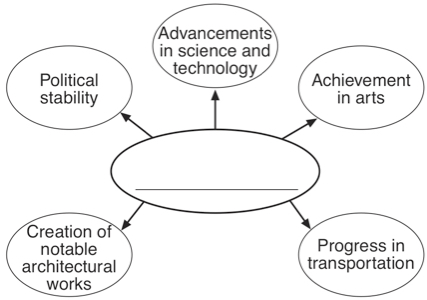
43 Which title best completes this graphic organizer? (1) Characteristics of the Inca Golden Age(2) Reasons for the Reconquista (3) Results of Lenin’s New Economic Plan (4) Features of the Marshall Plan |
43 What has been learned about civilizations in the past? (1) Religion is the best organizer.(2) Centralized control matters because cultures are more important than individual citizens. (3) Bigger is better. (4) Overreach is possible in any organization and individuals need to be prepared to detect and correct it. Correct answer: 4. Why do civilizations rise? Why do they fall? Accordingly, where do you place our own? Do you suppose an age ever considers itself a dark age? Why not? |
Base your answer to question 44 on the passage below and on your knowledge of social studies.
44 The situation described in this passage led to the (1) pogroms in Russia(2) fall of Constantinople (3) division of Sunnis and Shiites (4) tensions between Protestants and Catholics |
44 Which of the following show that religions have cultural and political consequences? (1) Christianity rose within the Roman Empire to become the religion of the state(2) Islam currently believes that its tenets ought to be built into governing institutions that cover even non-believers. (3) The protestant reformation eventually cost England’s King James his head. (4) all of the above Correct answer: 4. Besides the purely personal, religious acts are political acts that affect others of the current generation and many future generations. Different religions, like different cultures, can be held accountable for how they choose to interact with others. They are not shielded from scrutiny simply because their beliefs are their own. |
Base your answer to question 45 on the wood block print below and on your knowledge of social studies. 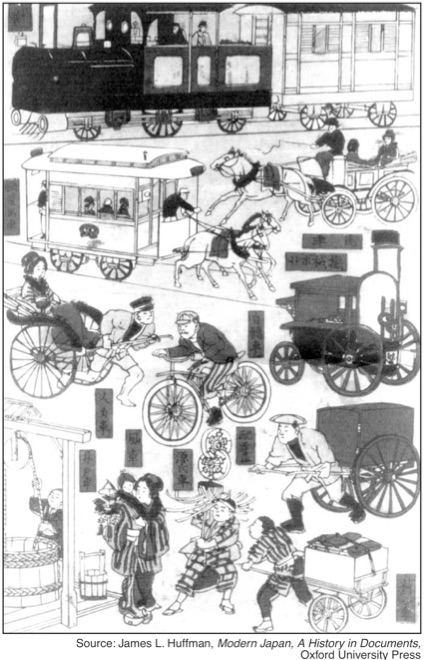 45 During which period of Japanese history did the changes shown in this wood block print occur? (1) Heian court(2) Tokugawa shogunate (3) Meiji Restoration (4) United States occupation |
45 Which events signify the advantages of cultural cross-pollination? (1) Japanese automobile just-in-time production techniques revolutionized manufacturing(2) Arabic and Persian mathematicians codified Greek, Babylonian, and Indian works into algebra (3) Greek architectural techniques were borrowed by Romans to design their major public buildings (4) all of the above Correct answer: 4. Other cultures may sometimes constitute a threat, but they always constitute an opportunity to check one’s work. If, in our culture, democracy codifies the opportunity for the smallest voice to be heard, because it may suggest a better way of doing things, then other cultures offer the same opportunity. |
46 Between 1300 and 1600, which economic system began to develop as a result of the transformation in global trade? (1) socialism(2) capitalism (3) communism (4) manorialism |
46 What is required for a successful commercial marketplace? (1) open competition with minimal but effective regulation(2) regulation by national bureaucrats free to interpret legislative rules (3) centralized planning (4) mercantilist protection Correct answer: 1. In the 1500s, the Dutch provinces were an unlikely place for the development of the commercial marketplace, but within a hundred years, the standard of living of its populace had multiplied. Why? It declined as a world power a hundred years later. Why? |
47 The combined usage of the caravel, compass, and astrolabe in the late 1400s helped bring about the (1) migration of the Bantu(2) exploration of the Americas (3) introduction of Buddhism to East Asia (4) voyages of Zheng He |
47 Innovation and entrepreneurship depend upon: (1) access to capital(2) access to markets (3) freedom from overly restrictive regulation (4) all of the above Correct answer: 4. Innovation and entrepreneurship have profoundly influenced the advance and retrenchment of cultures. What conditions have traditionally led to advance and what conditions have traditionally led to decline? |
48 Which time period is most closely associated with these characteristics?
(2) Early Middle Ages (3) European Renaissance (4) Scientific Revolution |
48 Linear perspective was a painting technique introduced in the 1300s that parallels what tool of thought? (1) graphic organizers in the classroom(2) looking at arguments from other points of view (3) sense of time and one’s place in time (4) elementary deduction Correct answer: 2. Art in the early renaissance introduced linear perspective that soon made its way into literature as point of view, and into thought as a check on one's thinking. As a tool of thought, what more recent tools for thought have been adopted, and why might they be valuable? |
|
49
One way in which these events are similar is that each resulted in the (1) establishment of uniform legal codes(2) emigration of people from their homelands (3) intervention of coalition military forces (4) acceptance of new political boundaries |
49 The idea that there might be a better way: (1) is codified in democracy(2) is process or dynamic thinking rather than static thinking (3) means that the smallest voice may be the wisest (4) all of the above Correct answer: 4. Civilization is tissue thin, and it is up to every individual to understand the minimum behavior civilization requires, what constitutes a threat against it, and to stand up to defend it. First and foremost, civilization requires the willingness to admit there might be a better way, and to be open to criticism, even though it might come across as offensive. Simply because society allows the freedom to offend, does not imply the obligation to do so. |
|
50 Which of these groups were the major supporters of 20th-century communist revolutions? (1) priests and artisans(2) bourgeoisie and nobility (3) entrepreneurs and capitalists (4) workers and peasants |
50 Based on the ideas of Karl Marx, Communism: (1) fostered competition outside government(2) celebrated individuality (3) rewarded economic entrepreneurship (4) undermined the quality of life for millions of citizens caught under it. Correct answer: 4. Karl Marx wrote in the 1840s in a world quite different from our own. Marx justified his positions by the selective use of fact, and proposed a system that did not remove competition, but instead hid it underneath a veil of government. Rather than creating a system that enabled the individual, the Communism that followed from Marx repressed the individual and initiative and undermined the quality of life for millions of citizens caught under it. |
In Part II, the theme of the required essay is the notion, “The ideas of individuals have had a significant influence on groups, nations, and regions.” The student is required to, “Select two individuals and for each
Part IIIA tested with short answers the student’s ability to read.
Part IIIB required an essay describing instances of how geographic factors affect regions.
In most instances, the questions in the official Global History Regents Exam are so trivial they call out for one more multiple choice answer: (5) Who cares?
Although this critique examines Global Studies, the approach and concepts apply equally well to other subjects.
Educating Stability Table of Contents
Previous chapter: Educating Stability: Individuals and Society
Creative Commons License from: Fir0002/Flagstaffotos U. S. Navy. Escher, M. C. Print